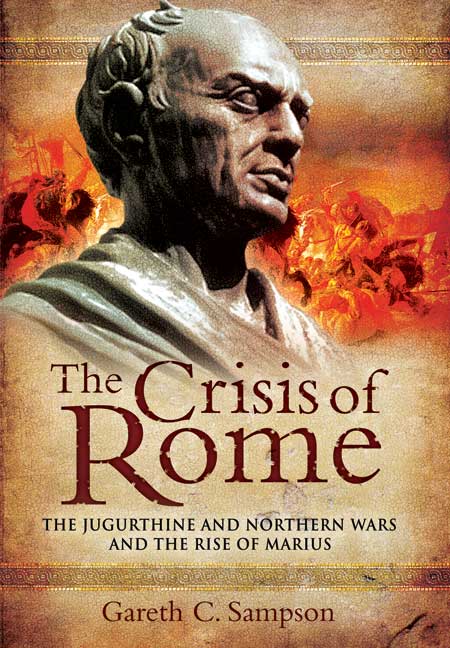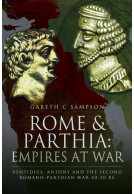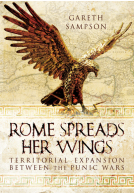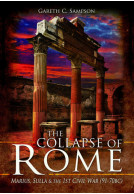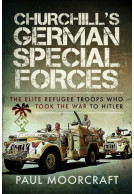The Crisis of Rome (ePub)
The Jugurthine and Northern Wars and the Rise of Marius
Imprint: Pen & Sword Military
File Size: 13.0 MB (.epub)
Pages: 288
Illustrations: 16 black and white illustrations
ISBN: 9781848846951
Published: 19th May 2010
| Other formats available | Price |
|---|---|
| The Crisis of Rome Paperback Add to Basket | £14.99 |
In the later 2nd century BC, after a period of rapid expansion and conquest, the Roman Republic found itself in crisis. In North Africa her armies were already bogged down in a long difficult guerrilla war in a harsh environment when invasion by a coalition of Germanic tribes, the Cimbri, Teutones and Ambrones, threatened Italy and Rome itself, inflicting painful defeats on Roman forces in pitched battle.
Gaius Marius was the man of the hour. The first war he brought to an end through tactical brilliance, bringing the Numidian King Jugurtha back in chains. Before his ship even returned to Italy, the senate elected Marius to lead the war against the northern invaders. Reorganising and reinvigorating the demoralised Roman legions, he led them to two remarkable victories in the space of months, crushing the Teutones and Ambrones at Aquiae Sextae and the Cimbri at Vercellae.
The Roman army emerged from this period of crisis a much leaner and more professional force and the author examines the extent to which the 'Marian Reforms' were responsible for this and the extent to which they can be attributed to Marius himself.
Dr Sampson has written an eminently readable and engaging work on this fascinating period.
Chris Buckham, The Military Reviewer
In the later 2nd century BC, after a period of rapid expansion and conquest, the Roman Republic found itself in crisis. In North Africa her armies were already bogged down in a long difficult guerilla war in a harsh environment when invasion by a coalition of Germanic tribes, the Cimbri, Teutones and Ambrones, threatened Italy and Rome itself, inflicting painful defeats on Roman forces in pitched battle. Gaius Marius was the man of the hour. The first war he brought to an end through tactical brilliance, bringing the Numidian King Jugurtha back in chains. Before his ship even returned to Italy, the senate elected Marius to lead the war against the norther invaders. Reorganising and reinvigorating the demoralised Roman legions, he led them to two remarkable victories in the space of months, crushing the Teutones and Ambrones at Aquiae Sextae and the Cimbri at Vercellae. The Roman army emerged from this period of crisis a much leaner and more professional force and teh author examines the extent to which the 'Marian Reforms' were responsible for this and the extent to which they can be attributed to Marius himself.
Spartacus Review
Between the Punic Wars and the rise of Caesar the Roman Republic faced a series of often-forgotten crises, facing wars in Gaul, Macedonia and North Africa, each of which the Roman armies saw serious defeats. The credit for saving the Republic was won by Marius, the first of the series of soldier-statesmen that ended with Caesar and the death of the Republic.
History of War Website August 2010
Sampson has produced a well argued narrative of these wars, admitting when speculation is needed because of the limits of our sources. In these cases he often includes sizable quotes from the conflicting sources, allowing us to decide if we agree with his conclusions. This was a period of serious but over obscure crises, some of which have left virtually no trace in the records other than a single mention of a defeat or a battle.
Marius is the central figure for most of this period, eventually winning both the Jugurthine and Northern Wars. He is also generally credited with having reformed the Roman army, although Sampson does a very good job of dismantling this idea, making food use of the sources to do so.
This is an interesting account of an obscure but critically important period in the history of the Roman Republic, making food use of the admittedly limited sources to produce a clear picture of a series of wars that genuinely threatened the existence of the young empire.
About Gareth C Sampson
After a career in corporate finance, Gareth C Sampson returned to the study of ancient Rome and gained his PhD from the University of Manchester, where he taught for a number of years. He now lives in Plymouth with his wife and children.







